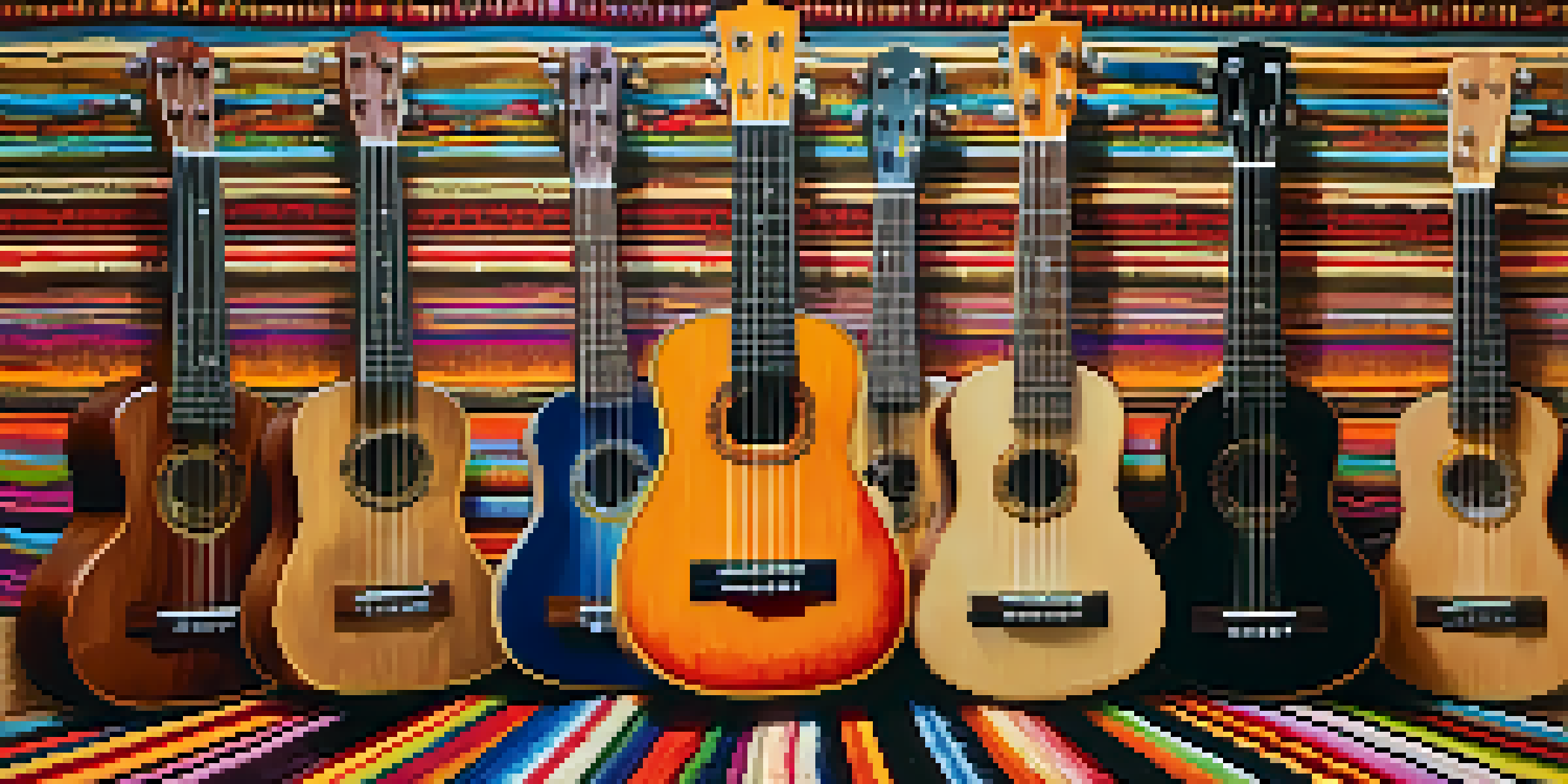Ukulele Size and Sound: Finding the Perfect Combination

Understanding Ukulele Sizes: Soprano to Baritone
Ukuleles come in four main sizes: soprano, concert, tenor, and baritone. Each size has its unique sound and playability, catering to different musical styles and player preferences. The soprano is the smallest, known for its bright and cheerful tone, while the baritone offers a deeper, more resonant sound akin to a guitar.
Music is the shorthand of emotion.
The size not only affects the sound but also the overall playability. A soprano might feel cramped for larger hands, while a tenor or baritone could be cumbersome for small hands. Understanding these physical dimensions helps players choose a ukulele that feels comfortable and sounds good.
As you explore these sizes, consider how they fit into your musical journey. Whether you're strumming at a beach bonfire or performing at a local venue, the right size can enhance your experience and performance.
How Size Influences Sound Quality
The size of a ukulele directly impacts its sound quality. Larger ukuleles like the baritone produce deeper, fuller tones, while smaller ones like the soprano offer bright, higher-pitched sounds. This tonal difference can significantly affect your music’s emotional impact.

Resonance is another key factor affected by size. Bigger bodies allow for more air movement, which can produce a richer sound. If you're looking for a warm, rounded tone, a tenor or baritone may be your best bet, while a soprano will excel in brightness and clarity.
Choose Size for Comfort and Sound
Selecting the right ukulele size enhances both playability and sound quality, tailoring the instrument to your musical style.
Ultimately, the choice between sizes should reflect your musical goals. If you're aiming for a lively, upbeat sound, the soprano may be ideal, but for deeper melodies, consider the larger options. Finding the right balance between size and sound is crucial for an enjoyable playing experience.
Choosing the Right Size for Your Playing Style
Your playing style plays a significant role in determining the best ukulele size for you. If you primarily strum chords and enjoy a lively sound, a soprano or concert ukulele may suit you well. On the other hand, if fingerpicking and intricate melodies are your focus, a tenor or baritone could enhance your performance.
The beautiful thing about learning is that no one can take it away from you.
Consider where and how often you’ll be playing as well. For casual jams or travel, a soprano may be more portable and convenient. However, if you’re performing on stage or in larger settings, a tenor or baritone might provide the volume and depth needed to fill the space.
Ultimately, experimenting with different sizes can help you discover what feels and sounds best for you. Don't be afraid to step out of your comfort zone and try various sizes to find your perfect match.
The Impact of Wood Types on Sound
The type of wood used in a ukulele significantly influences its sound quality. Common woods like mahogany and cedar offer different tonal characteristics. Mahogany tends to produce a warm, mellow sound, while cedar can provide a brighter, more resonant tone, especially in larger ukuleles.
Additionally, the thickness and quality of the wood contribute to the overall sound. Thinner woods may produce a louder, more vibrant sound, while thicker woods often yield a richer, deeper tone. Consider these factors when selecting a ukulele that complements your desired sound.
Wood Types Shape Your Sound
The type of wood used in a ukulele significantly influences its tonal characteristics, affecting the overall sound quality.
You might also want to explore exotic woods or laminated options, which can offer unique sounds and aesthetics. Understanding the relationship between wood type and sound can help you make an informed decision and find a ukulele that resonates with your musical style.
String Types and Their Influence on Sound
The strings you choose for your ukulele can also affect its sound. Nylon strings are standard for most ukuleles, providing a warm, mellow tone. However, you might also encounter fluorocarbon strings, which offer a brighter, more focused sound with greater projection.
Different string gauges can change the feel and sound of your ukulele as well. Lighter strings are easier to play and can produce a sweeter sound, while heavier strings can offer more volume and sustain. Your choice of strings should align with your playing style and sound preferences.
Experimenting with various strings can help you uncover new dimensions to your music. Don’t hesitate to swap strings to fine-tune your sound and find the perfect combination for your ukulele.
How to Test Ukuleles for Size and Sound
When searching for the perfect ukulele, testing different sizes is essential. Visit a music shop where you can hold and play various models. Pay attention to how each size feels in your hands, as comfort is key for long practice sessions.
As you play, listen closely to the sound produced by each ukulele. Strum chords and try fingerpicking to hear how the instrument responds. Take note of any differences in tone and volume, as well as how each size suits your playing style.
Experiment with Strings for Tone
Different string types and gauges can dramatically alter your ukulele's sound, allowing for a personalized playing experience.
Don’t hesitate to ask for assistance from store staff, who can offer valuable insights and recommendations. Testing multiple ukuleles will help you find the one that truly resonates with you.
Final Thoughts: Finding Your Perfect Ukulele
Finding the perfect ukulele is a personal journey that combines size, sound, and playability. Consider your musical style, preferences, and the environments in which you’ll be playing. Each size offers unique advantages, and the right choice can elevate your playing experience.
Take your time exploring different options and don’t rush the decision. Each ukulele has its personality, and the more you play, the better you’ll understand what works for you. Remember, it’s not just about finding the biggest or the fanciest instrument; it’s about finding the one that feels right in your hands.

As you embark on this journey, remain open to discovery and enjoyment. With the right ukulele, you’ll not only play better but also create music that truly reflects your unique voice.